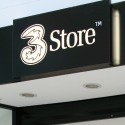
Three UK is ripping out Samsung's 4G radio equipment and introducing gear from Huawei to ensure there is interoperability between its 4G and 5G networks.
The operator, which runs the smallest of the UK's four mobile networks, built its original 3G radio access network (RAN) with Nokia before turning to Samsung in the 4G era. Last August it announced that China's Huawei would be its sole supplier of 5G RAN technology.
That raised questions about Three's commitment to Samsung: Experts say an operator building a "non-standalone" 5G network -- which piggybacks on the 4G core -- must buy 4G and 5G RAN equipment from the same vendor to avoid interoperability problems.
But Three has now confirmed to Light Reading that its contract with Huawei covers the replacement of Samsung in the 4G network as well as the installation of new 5G equipment. "With the Huawei program we are swapping the Samsung 4G and deploying 5G," said Mike Eales, Three's head of network services strategy and architecture. "With non-standalone the 4G underpins the 5G so it has to be the same vendor. You can't use different vendors."
The heavy reliance on Huawei is potentially risky given the security concerns surrounding the company. US hardliners see it as a conduit for Chinese spies and have put pressure on European governments to ban it from their 5G markets.
The UK government is now carrying out a supply chain review that will determine if Huawei should be excluded from parts or the entirety of the country's 5G networks.
Three is operating on the assumption that any ban would be limited to the core, the central part of the network that routes traffic and includes important IT systems. Its main core network vendor is Finland's Nokia.
Shaun Smith, Three's 5G program director, said the National Cyber Security Centre (NCSC), the agency responsible for security matters, has been fully involved in Three's procurement process and that any decision affecting the RAN would be "unusual."
"It would hurt all the operators in this country in a very similar way," he said, pointing out that other UK service providers are also heavily reliant on Huawei's RAN equipment. "What is worth bearing in mind is that in our topology, our brand-new core is [from] Nokia, which is where all the intelligence is. The dumb radio kit is in the RAN and that was done with the NCSC's oversight."
The decision to move from Samsung to Huawei would not have been made lightly given the hassle and expense of replacing one RAN vendor with another. In making the case against a comprehensive 5G ban, Vodafone UK has previously argued that swapping out Huawei's 4G equipment -- used at about 6,000 of its 18,000 mobile sites -- would cost "hundreds of millions" and slow down the rollout of 5G services.
That all suggests Huawei bid extremely competitively for the RAN contract and that executives at Three were not satisfied with Samsung's 5G capabilities.
Want to know more about 5G? Check out our dedicated 5G content channel here on
Light Reading.
But Gabriel Brown, a principal analyst with Heavy Reading, says the move is not surprising. "Samsung hasn't really committed to Europe and so it was an inevitability that when Three went to tender it would be replaced," he tells Light Reading. "Samsung gear is good, but European operators want local support and supply chains and it didn't get enough scale in 4G to make this investment worthwhile. Also, this equipment has a lifespan and the Samsung gear had more or less come to an end."
Three, which maintains around 16,700 mobile sites across the UK, plans to launch a mobile 5G service in the fourth quarter of this year and is targeting a presence in 25 cities and towns by the end of 2019.
It reckons its generous spectrum holdings -- which came with its £250 million (US$316 million) takeover of UK Broadband in 2017 -- will allow it to provide much higher-speed and more reliable 5G services than its rivals are able to support. During recent trials in central London, it recorded average download speeds of 138 Mbit/s on its 5G network, up from 25 Mbit/s on 4G.
The company plans to market a 5G-based, fixed wireless access (FWA) residential broadband service as well as new smartphone offers: The FWA service is due to launch in August.
BT became the UK's first 5G operator when its EE operation launched commercial services in parts of the country at the end of May. Like Three, it is using Huawei's 5G gear to support those services but also relies on Nokia as a RAN vendor in less densely populated areas.
Vodafone, which is due to launch 5G services tomorrow (July 3), counts Ericsson and Huawei as its main RAN vendors, with Ericsson responsible for a bigger share of the RAN footprint. Earlier this year, Telefónica-owned O2 also announced plans to launch a 5G service by the end of 2019.
Related posts:
— Iain Morris, International Editor, Light Reading
About the Author(s)
You May Also Like




_International_Software_Products.jpeg?width=300&auto=webp&quality=80&disable=upscale)







